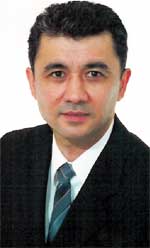Uzbek Baltic Center makes bridges
By Fahritdin Arifhanov, president of the Uzbek Baltic Centre International Trade and Industrial Association
The Uzbek Baltic Center International Trade and Industrial Association was created at the beginning of 2002. The Main purpose of the organization is to stimulate international trade between the region of Asia and the Baltics. So the primary task of the association on its development stage will be a creation of an information database, advertisement of the organization and its activities, advertisement of its associated members, assistance in organizing joint-ventures, development of investment programs and participation in the development of trade and economic relations of the Baltic states and Uzbekistan. The association is a classic organization of its sort, however at the same time it has some distinguishing features: founders of the association are well situated in the business sphere, they know the legal, taxation, financial-credit and foreign-economic ambience of activities both in the Baltic states and in the Asian region.
 Fahritdin Arifhanov |
On the other hand, will the newly created association find its place amongst the other organizations of its sort? This is a rhetorical question, and we are certain that the answer can only be positive. Even now the organization is sponsored by companies from Lithuania, Latvia, Germany and Uzbekistan. Some of them have already become members of our association. Contacts have been established with the Ministry of the Foreign Economic Relations of Uzbekistan, The Chamber of Businessmen and Commodity Producers of Uzbekistan, The Confederation of Western Lithuanian Industrialists, the branch of the International Congress of Manufacturers and Businessmen in the Republic of Lithuania.
Lithuania was not accidentally chosen for the location of the Uzbek Baltic Center. Lithuania, just as Latvia and Estonia, have reached visible results towards the process of integration in the European Union and transatlantic alliances. In their negotiations for entering the European Union, Lithuania, Latvia and Estonia have practically overtaken the Luxembourg group of countries, and actually plan to finish negotiations together with the Luxembourg group and be invited to join the European Union by 2004. Transatlantic integration through the NATO alliance has seen the Baltic states together with Slovenia currently being the most advanced, and in fall 2002 they hope to get an invitation for joining the alliance.
There is a reason for speaking of this, because the membership of Lithuania, Latvia and Estonia in the European Union and NATO will only brighten the economy of these independent countries, and will give some psychological warranties for foreign investors. So foreign trade between the Baltic states and Asia will only win.
I cannot but note the geopolitical position of the Baltic countries: their suitable geographical position, good relations with neighbors. In the near future the Russian Duma plans to also ratify the border agreement between Lithuania and Russia. The transit truck roads, crossing north-south and west-east directions, the non-freezing Klaipeda port and other Latvian and Estonian ports all meeting world standards, transport companies with the experience of working in both Western and Eastern markets, as well as a skilled labor force knowledgeable in languages. Certainly, these are not all the merits, however, today I have no purposes to enumerate all of them. The Baltic states are countries, which, in our opinion, that suit development of activities for the Uzbek Baltic Center International Trade and Industrial Association best.
Besides, existing processes of transformation reveal themselves on the one hand through internationalizing and regionalizing, and on the other through globalization and localization. The Association is lying in the sidelines and is trying to participate in all these processes, striving to establish contacts for the association's clients to be involved in the process of globalization and reception of world revenues in both the Baltic states and other countries. We understand this and see that the globalization process has not stifled national identity, but has emphasized it and has added more original features, based on which the future economies of the associated country members would develop, with the members profiting from this.
Statistics show that the size of the foreign trade between the Baltic states and Uzbekistan have for the last 10 years increased not as powerfully as we would have liked it to. The structure of foreign trade is classic and reflects the possibilities and potential facilities of partners. But the potential is considerable, both on the part of the Baltic states, and Uzbekistan. Another situation is with the foreign trade of Lithuania and other countries of the Baltic region - Latvia, Estonia, Poland, Sweden, Finland, Denmark, Germany. For example, the main partners of Lithuania in foreign trade in 2001 were Germany, Great Britain, Latvia, Poland, and Russia. The main partners of Lithuania in export - Great Britain, Latvia, Germany, Russia, in imports - Russia, Germany, Poland, Italy.
If we analyze the structure of facilities of the mentioned countries, this opens broad possibilities for the association and its members for the use of competitive advantages of the facilities of the countries in both regions, not only developing foreign trade, which goes without saying, but also developing tourism, encouraging different forms of investments, and finally, contributing in the fields of science and technology.
The facilities of Uzbekistan are traditionally strong in the field of agriculture, mining and processing, the textile industry, transport, production and in recent years also construction. In Lithuania and Latvia it is traditionally food and light industry enterprises, these countries have developed infrastructure for transport services, and have a well-developed financial system.
Usually after an increase of volumes in foreign trade, foreign investments enter a country. As is well known, foreign investments are one of the main factors for the restoration of economies. The association will also try to attract direct foreign investments. In our opinion, their flow will depend on the countries and associated members of our association and the competitive advantages of their companies, from the advantage facilities of the countries and their specialization.
|
